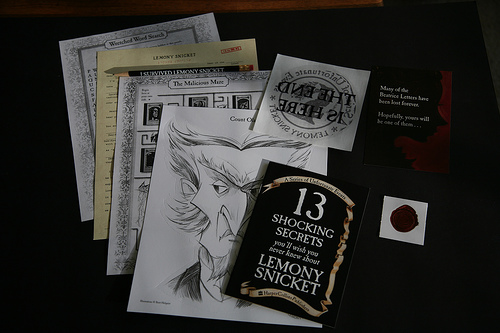Every Word I Needed to Know On the SAT I Learned from Lemony Snicket’s A Series of Unfortunate Events
Posted by
Magali Roman
(Image via flickr)
Maybe it's just me, but I never really had a problem with the vocabulary section of the SAT in high school. Granted, this might be because of my superior intellect, but I’ve got another theory. When you make a habit of reading interesting novels with pretty interesting words as a kid, you start adapting a pretty interesting way of speaking simply through osmosis. Interesting, no?
Case in point—I credit Lemony Snicket’s superb (though completely and cruelly cliff-hanging) A Series of Unfortunate Events with 90% of my success at fooling my college professors into thinking I’m articulate. Simply put, the man’s proclivity for unnecessarily complicated terms has probably done more for the state of American literacy than all the PSSAs combined.
And so, we’re presenting you with nine superb vocabulary words that pretty much ensure you’ll never look twice at that section of the SAT again, courtesy of a man who has literally tricked us into reading the dictionary—and enjoying it—for the better part of ten years.
Incentive, n. The Bad Beginning
“Books about law are notorious for being very long, very dull, and very difficult to read. This is one reason many lawyers make heaps of money. The money is an incentive – the word 'incentive' here means 'an offered reward to persuade you to do something you don't want to do' – to read long, dull, and difficult books.”
Insipid, adj. The Reptile Room
“When you were very small, perhaps someone read to you the insipid story — the word insipid here means not worth reading to someone — of the Boy Who Cried Wolf.”
Moral, n. The Miserable Mill
“The moral of 'The Three Bears,' for instance, is 'Never break into someone else's house." The moral of "Snow White" is "Never eat apples." The moral of World War One is "Never assassinate Archduke Ferdinand."
Newspaper, n. The Vile Village
“A newspaper, as I'm sure you know, is a collection of supposedly true stories written down by writers who either saw them happen or talked to people who did. These writers are called journalists, and like telephone operators, butchers, ballerinas, and people who clean up after horses, journalists can sometimes make mistakes.”
Fate, n. The Slippery Slope
“Fate is like a strange, unpopular restaurant filled with odd waiters who bring you things you never asked for and don't always like.”
Conversation Opener, n. The Grim Grotto
"An interesting sentence to say out loud in order to get people talking."Who would like to see an assortment of photographs taken while I was on vacation?" for instance, is a very poor conversational opener, because it is likely to make your fellow diners shudder instead of talk, whereas good conversational openers are sentences such as "What would drive a man to commit arson?," "Why do so many stories of true love end in tragedy and despair?," and "Madame diLustro, I believe I've discovered your true identity!," all of which are likely to provoke discussions, arguments, and accusations, thus making the dinner party much more entertaining.”
Adversity, n. The Austere Academy
“Count Olaf.”
Triumph, n. The Bad Beginning
“The Baudelaires had triumphed, a word which here means "unmasking a cruel and talentless arsonist, and solving the mystery of the Baudelaire fire."
Bubble/peacock/vacation/the/author/execution, n. The Ersatz Elevator
“The world 'bubble' is in the dictionary, as is the word 'peacock,' the word 'vacation,' and the words 'the,' 'author's,' 'execution,' 'has,' 'been,' 'cancelled,' which make up a sentence that is always pleasant to hear. So, if you were to read the dictionary, rather than this book, you could skip the parts about 'nervous' and 'anxious' and read about things that wouldn't keep you up all night, weeping and tearing your hair out. But this book is not a dictionary, and if you were to skip the parts about 'nervous' and 'anxious' you would be skipping the most pleasant parts of the entire story. Nowhere in this book will you find the words 'bubble,' 'peacock,' 'vacation,' or, unfortunately for me, anything about an execution being cancelled.”
—
Magali Roman is 25% student, 50% blogger/ professional ranter and 100% frustrated historical figure stuck in the 21st century. On her free time she reads French badly, tries to stop philosophizing but finds she Kant, and corrects everyone’s Spanish pronunciation. Follow her at @swagali_broman.




